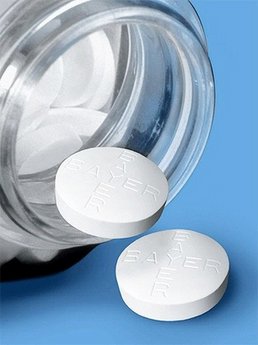
Bayer aspirin. Taking aspirin or similar blood-thinning medication may cause minute bleeding in the brains of older adults, according to a new study.[Agencies]
WASHINGTON – Taking aspirin or similar blood-thinning medication may cause minute bleeding in the brains of older adults, according to a new study.
The report released Monday in the Archives of Neurology found that older patients taking aspirin appeared more likely to have barely-perceptible bouts of cerebral "microbleeding," detected by researchers with the aid of magnetic resonance imaging (MRI) technology.
Compared with patients who did not use anti-clotting drugs, those who took aspirin or another anticoagulant drug, carbasalate calcium, were more likely to have cerebral microbleeds.
The study found that the link between the drugs and microbleeding was particularly pronounced among individuals taking aspirin at higher doses. The drug often is taken as a blood thinner by elderly people to treat or prevent heart disease.
Cerebral microbleeds -- sometimes a sign of small-vessel disease and common in the elderly -- occur when the walls of blood vessels in the brain become weakened.
The authors said the findings raise questions as to whether patients with cerebral microbleeds who also take aspirin or similar drugs are at increased risk for even more severe symptomatic brain hemorrhaging.
While for many heart attack and stroke patients, the beneficial effects of anti-clotting drugs for individuals at risk for heart attack and stroke typically outweigh any risks of bleeding, the authors of the study concluded that for some patients "this risk-benefit ratio may differ for certain drugs ... thus influencing treatment decisions."
The report, which was posted online Tuesday, is to be published in the June edition of the publication, one of several put out by the Journal of the American Medical Association.
The study was conducted by doctors at Erasmus MC University Medical Center, Rotterdam, the Netherlands and involved 1,062 patients whose average age was about 70 years old.
taken from : China Daily



No comments:
Post a Comment